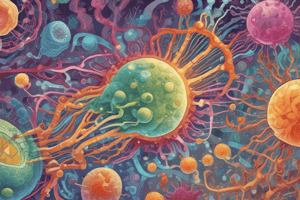Podcast
Questions and Answers
What is the function of cytokines?
What is the function of cytokines?
- Regulate the intensity and duration of immune responses and blood cells (correct)
- Inhibit the immune system
- Promote the growth of pathogens
- Have no significant function in the body
What is an opportunistic pathogen?
What is an opportunistic pathogen?
- A pathogen that only affects individuals with lung disease
- A pathogen that is harmless in normal conditions but becomes harmful in a compromised host (correct)
- A pathogen that is always harmful in any host
- A pathogen that only affects immunocompromised individuals
What is a nosocomial infection?
What is a nosocomial infection?
- An infection caused by fungi
- An infection caused by antibiotic-resistant bacteria
- An infection transmitted through the air
- An infection that occurs in hospitals (correct)
Who discovered Koch's postulates?
Who discovered Koch's postulates?
What is herd immunity?
What is herd immunity?
What is the difference between a sign and a symptom?
What is the difference between a sign and a symptom?
What is the effect of endotoxins released by gram-negative bacteria?
What is the effect of endotoxins released by gram-negative bacteria?
What does the ID 50 measure?
What does the ID 50 measure?
What is opsonization?
What is opsonization?
What type of vaccine contains inactivated toxins produced by a pathogen?
What type of vaccine contains inactivated toxins produced by a pathogen?
Flashcards are hidden until you start studying




